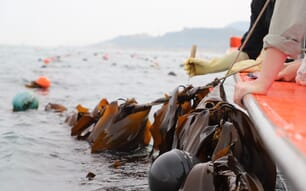Solea is the only company in the world farming North Sea sole. It was set up around breeding facilities established by IMARES in IJmuiden eight years ago, when it became apparent that sole had all but disappeared from the North Sea. It was not as simple as it seemed - Solea has recently gone bankrupt. But doctoral researcher Robbert Blonk, who has been testing selective breeding at Solea in the past few years, is confident that it would be worth reviving the company. 'I would invest in Solea myself.'
Sole is difficult to farm. Artificial insemination does not work, so the fish have to reproduce naturally in groups, using parent fish caught at sea. This way it takes on average two years for the sole to reach the target weight of 200 grams. That is too long and therefore too expensive.
Mr Blonk wanted to speed up this growth by selecting the fastest-breeding sole, but he ran into obstacles here too. A DNA analysis showed that more than half the offspring had come from just six parent fish. Blonk used DNA markers to select parent fish that were genetically varied, and he also selected the fastest growing parent fish. In two years, this produced sole with a 20 per cent higher average weight. In other words: with his selection method the sole reached their target weight in one and a half years instead of two. Blonk also looked into how far the growth of the sole was determined by heredity. It turned out that 25 per cent of the growth rate was genetically determined. Another big factor is nutrition, as well as the conditions at the fish farm.
Mr Blonk's breeding programme will not produce results in the short term. 'We selected the parents two years ago with this method. Sole reaches reproductive maturity only after four years. The initial results of the breeding programme can therefore only be expected in two years' time.' Mr Blonk's research was funded by Dutch research organization NWO. He will received his PhD on 5 November and then set to work at IMARES.
Selective Breeding Speeds Up Growth Of Sole
NETHERLANDS - Wageningen doctoral researcher Robbert Blonk has found a way of speeding up the growth of North Sea sole considerably. This may make sole farming more viable.

